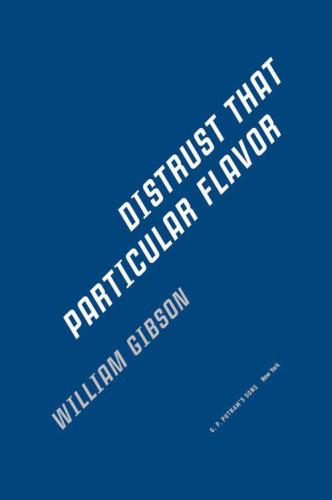
Distrust That Particular Flavor
کتاب های مرتبط
- اطلاعات
- نقد و بررسی
- دیدگاه کاربران
نقد و بررسی

November 15, 2011
Cyberpunk's patron saint of prose proves that his reality is every bit as trippy as his fiction. Gibson's gift for language is such that banal discussions of Steely Dan and even eBay easily take on otherworldly aspects. In his universe, Singapore is left of Pluto, London lies in the Crab Nebula and Tokyo, of course, might well have its own extra-dimensional zip code. Fans of Mona Lisa Overdrive, Neuromancer and Gibson's other popular sci-fi novels will not find this at all strange. There is an element of exclusivity to Gibson's writing that almost lies at the polar end of exposition—or as the author might write, "geared in some achingly complex sphere within sphere way." The illumination in this text comes from the extent to which the complex author reveals himself to be entirely ordinary, just an average Joe trying to make a living off his writing. Recollections of learning the craft, avoiding the Vietnam War, meeting a woman and getting married show that the man who pioneered "cyberspace" (while actually coining the term) is actually just a normal guy. The welcome humanity seeping through the cracks of this matrix serve as an intriguing counterpoint to the esoteric musings heaped on everything from Japanese movie stars to curious storefront windows. Other targets of the author's wonder include the Internet, Futurism and one dude's particularly snazzy pair of jeans. Gibson bolsters the good feelings even further by following up each of these original entries with a brief explanation of what he was thinking about at the time of their creation. In this case, understanding the writer a little better makes the fantastic thoughts emanating from his head all the more captivating and strange. A provocative, surprising look at the lesser-known parts of a sci-fi superstar's writing career.
(COPYRIGHT (2011) KIRKUS REVIEWS/NIELSEN BUSINESS MEDIA, INC. ALL RIGHTS RESERVED.)

August 1, 2011
From Neuromancer, his edgy opener over 25 years ago, to last year's techno-insightful Zero History, Gibson has written arresting fiction. Perhaps less well known but just as arresting is his nonfiction. Gibson's pieces have appeared in many venues, e.g., Wired (drug trafficking in Singapore). This volume collects 30 years' worth of journalism, including material that was never published, appeared only online, or graced magazines that no longer exist. A kaleidoscope likely to interest anyone interested in current culture.
Copyright 2011 Library Journal, LLC Used with permission.

December 1, 2011
One cannot argue that Gibson's visionary fiction (Neuromancer, 1984; Pattern Recognition, 2003) is not prescient. In this collection of essays, one from 1989, Rocket Radio, repeatedly mentions the Net. In his introductory comments, Gibson admits he knew not Net, when I wrote this, other than as the mass culture and the mechanisms of Information. And this is from the man who coined the word cyberspace in 1981. Gibson famously was a latecomer to e-mail and the web and didn't spend time online until his brief eBay addiction, bidding on mechanical watches. He may be modest and self-effacing, but he is always sharp and entertaining. Included here one will find terms like meme, viral, cognitive dissonance, nodal event, temporal dislocation, and liminal. All cultural change is essentially technologically driven, he writes, addressing how Japan was booted down the timeline by the arrival of Commodore Perry in 1852 and later the dropping of the atomic bomb in 1945 to become the Blade Runner-like setting of his novels. Gibson dislikes being called a futurist. His nonfiction, like his novels (and the best science fiction), are really about the postindustrial present.(Reprinted with permission of Booklist, copyright 2011, American Library Association.)

























دیدگاه کاربران